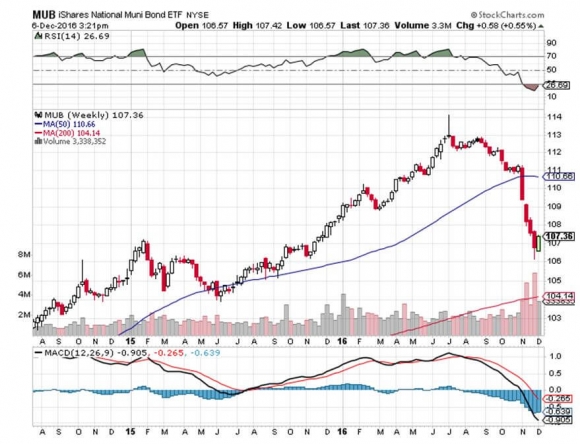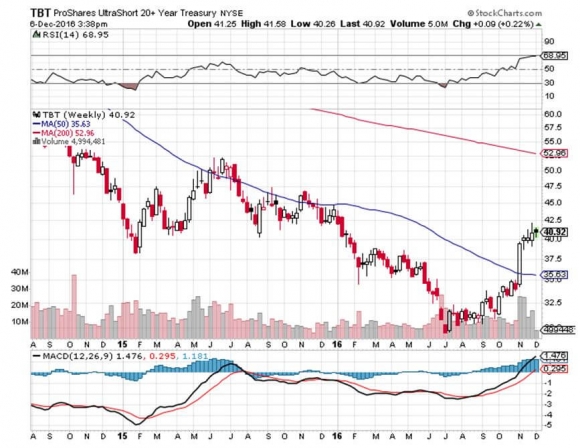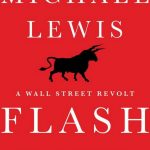What To Do About Municipal Bonds?
While the entire fixed income space is getting decimated by Trump?s plans to vastly expand government deficit spending, there is one particular sector that is coming in for extra abuse.
That would be tax-free municipal bonds.
This is a big deal, because about one third of the readers of the Diary of a Mad Hedge Fund Trader are professional financial advisors.
The field was one of a few in which advisors could add value for clients, because the idiosyncrasies of these securities often limit tax exemptions to residents of a single state, county, city, or utility or bridge district.
Advisors working at big firms also get special access to new issues unique to their clients? residential requirements.
The end result of a 30-year bull market in bonds is that many of them have saddled their clients with very heavy weightings in munis. Some have even distilled their businesses purely into municipal bond practices.
This was a great strategy going into November 8th. Not so good the day after.
The reasons are very simple.
During a time of raising taxes, such as during the past eight years, muni bonds traded at premiums, and the tax aspect of the securities becomes over valued.
During time of falling taxes, the tax free character of munis is less attractive, and they become undervalued.
On the morning of November 9th, about 2:00 AM the entire $3.7 trillion municipal bond market flipped from undervalued to overvalued.
That was when is became clear that Trump would capture the state of Pennsylvania, making it impossible for Hillary Clinton to win the presidential election.
The prospects of future tax increases under a Clinton administration thus went up in smoke.
The iShares National Muni Bond ETF (MUB) gave up all of its 2016 gains in a matter of days, and then some. It is now off a staggering 7.0% since its July high. Lesser-rated issues have fallen by much more than that.
Approximately $259 billion in muni bond market value has been wiped out in the past month.
These are the sharpest moves down in munis since analyst Meredith Whitney made her fateful prediction on CBS 60 Minutes in 2010 that some 2,000 muni bond issuers would default on their bonds during the coming year.
In the end I think only two actually did it.
The next day, the Mad Hedge Fund Trader put out a long term ?BUY? on muni bonds, especially those issued by the State of California, and they have been stellar performers ever since.
Until now.
This is a massive move for this normally sedentary corner of the financial markets.
Beleaguered financial advisors have been besieged by calls from clients asking what to do about their substantial muni bond holdings.
As I have been through this cycle a few times before during my half century in the markets, it is time for me to hand out some sage advice on what to do. Here are some options:
1) Panic and Sell Everything. This is usually a terrible idea. While coupon interest payments are tax exempt, the capital gains incurred if you sell aren?t.
If you have been holding your paper for any amount of time, like decades, the taxable gain could be enormous.
If you absolutely HAVE to sell for cash flow or other reasons, at least wait until next year, when capital gains taxes will almost certainly be cut.? At least then you won?t have to pay the taxes for 16 months instead of 4 ?.
2) Do Nothing. This is almost always the best option for long term, risk averse investors.
By launching a huge jobs program with jobless claims at a 43 year low and unleashing the demons of inflation, Trump has unwittingly planted the seeds of the next recession.
That will be caused by a severe interest rate spike that could happen in as soon as three years.
Then rates will crash, possibly making your muni bonds more valuable than they are today. And in the intervening three years you can keep happily clipping your coupons for tax-free income.
3) Hedge. Those who have the facility to do so may want to hedge the interest rate risk in their muni bond trades to reduce the volatility of their portfolio.
The easiest way to do this is to buy the ProShares Ultra Short 20+ Year Treasury Bond Fund (TBT), a 2X ETF that rises at roughly 1.5 times the rates that US Treasury bonds fall.
Look at the charts below, and you see that the 7% decline in the (MUB) since July was matched by a commensurate 42% rise in the (TBT). So the natural market neutral hedging ratio here will be about 6:1.
These are rough figures only, as they fail to account for differences in management fees and expenses.
The turmoil seen in the municipal bond market is going on in all asset classes at the same time as a result of the presidential election.
I will continue to hammer away in the Diary of a Mad Hedge Fund Trader ?at the short and long term implications for each one as soon as I figure them out.





